#Joseph Philpot
Explore tagged Tumblr posts
Text
Daily Portions

by Joseph Philpot
Devotional for March 6th
"You have delivered my soul from death." - Psalms 56:13
You may have been delivered from death, as much as David was, but not so fully in the assurance of the deliverance. God may have quickened your soul into life divine; he may have communicated his grace to your heart, and yet you have many doubts and fears whether it be a real work of grace upon your soul. It is not every child of God who has been delivered from death by regenerating grace, who can use the words with the confidence expressed here --"You have delivered my soul from death."But I will show you when he can. When God is pleased to bless him with a sense of his pardoning love; when Jesus is revealed to his heart, and manifested with power to his soul; when the blood of sprinkling is applied to purge his conscience from guilt, filth, and dead works, to serve the living God; when the Spirit of adoption is given, and he is enabled to cry,"Abba, Father;"when he can"read his title clear to mansions in the skies"by the witness of the Holy Spirit in his breast that he is a child of God; when he feels the presence of God, and a sweet flowing forth of love and affection to his heavenly Father -- at such favored seasons as these, he can say in the sweet confidence of faith,"You have delivered my soul from death."
17 notes
·
View notes
Text

"Two Youths Committed," Windsor Star. July 17, 1943. Page 5. --- Fazekas and Peltier to Face Breaking and Entering Trial ---- Joseph Peltier and Alex Fazekas, both Windsor youths with police records, were committed for trial by jury by Magistrate J. A. Hanrahan today in the county police court on a charge of breaking into the Philpott bake shop in Essex on June 13, and stealing nearly $600 in currency and $76 worth of war savings stamps. Fazekas also faces trial for escaping jail in Riverside.
TWO SET FREE Louis Balog and Donald George, who also were charged along with Peltier and Fazekas with this crime, were let off the charge for lack of sufficient evidence.
These four earlier in the week were all committed for trial by jury on charges of breaking into five summer cottages in South Essex resorts on the Lake Erie shore.
Peltier also was committed for trial by jury today on a charge of having a stolen car in his possession at his rented cottage at Colchester. The owner of the car was given as Mrs. Elsa Mace, wife of a London doctor.
OWNER TESTIFIES Bryce Philpot, owner of the Essex bake shop, told of how the place was entered through a window during the night, and the safe broken into. He said footprints of two men were found in the grass outside the window.
Constable J. S. Thurston told of finding books of war savings stamps valued at $76 in the cottage of Joseph Peltier when he searched it following the arrest of Peltier, Fazekas, Balog and George on other breaking and entry charges.
The constable told of finding a war saving stamp form crumpled up out- side the Peltier cottage. On it was written the name of Andrew Lucier, Larid avenue, Essex.
MR. CHASE On the witness stand, Mrs. Maxine Chase, bookkeeper for Philpot Bakering, identified the writing of Lucier's name and address as her own writing She said he was an employe of the shop and it was the practice of keeping the war savings stamp investments of the employes in the shop safe. She recalled having placed the firm bearing Lucier's name in the safe before the shop was closed on the night of the robbery.
#windsor#county police court#essex county#breaking and entering#break and enter#crime wave#looting cottages#summer cottages#cottage country#criminal gang#ex-convict#canada during world war 2#crime and punishment in canada#history of crime and punishment in canada
0 notes
Photo


CALIFICACIÓN PERSONAL: 6 / 10
Título Original: Ghosts of the Ozarks
Año: 2022
Duración: 107 min
País: Estados Unidos
Dirección: Matt Glass, Jordan Wayne Long
Guion: Sean Anthony Davis, Jordan Wayne Long, Tara Perry
Música: Matt Glass
Fotografía: Jason Goodell
Reparto: Thomas Hobson, Phil Morris, Tara Perry, Tim Blake Nelson, Angela Bettis, David Arquette, David Aaron Baker, Joseph Ruud, Neva Howell, Brandon Gibson, Scott Dean, Graham Gordy, Ed Lowry, Skylar Olivia Flanagan, Aaron Preusch, Taylor Alden, Corbin Pitts, Skyler Elyse Philpot, Tommy Terry Pantera Wageman
Productora: HCT Media
Género: Thriller; Horror; Mistery
https://www.imdb.com/title/tt11186952/
TRAILER:
dailymotion
0 notes
Text
Trust in God implies total self-renunciation. The moment that I trust in myself, I cease to trust in God. The moment I take any portion of my confidence away from the Lord and put a grain of it in myself, that moment I take away all my trust in God. My trust in God must be all or nothing. It must be unreserved and complete, or else it is false and delusive. Is not the Lord worthy to be trusted? And if He is worthy to be trusted at all, is He not worthy to be trusted with all? What real confidence could a man have in the wife of his bosom if he could trust her with one key, but not with all? Is that full confidence? So, if we can trust God for one thing and not for all, it shows that we have no real trust in Him. A man has no real trust in his wife who cannot give her all the keys.
Joseph Charles Philpot
#this is absolutely vital#this hits hard#trust in god#radical surrender#Joseph Charles Philpot#reflect on this#remember this#religion is all or nothing
10 notes
·
View notes
Text
'Ammonite' Is Historical Fanfiction About the World's First Great Fossil Hunter
https://sciencespies.com/nature/ammonite-is-historical-fanfiction-about-the-worlds-first-great-fossil-hunter/
'Ammonite' Is Historical Fanfiction About the World's First Great Fossil Hunter
Paleontology wouldn’t be the same without Mary Anning. She scoured the dreary coast of southern England for secrets not seen since the Jurassic, fueling the nascent 19th-century field of fossil studies with evidence of strange sea dragons, flying reptiles and other fascinating fragments of life long past. And now, over 170 years after her death, she’s got her own movie.
Ammonite will open at the Toronto Film Festival but isn’t set to premiere in theaters or in homes until later this year, but the historical drama is already stirring the waters like an excitable Plesiosaurus. The first trailer for the film hit the web yesterday. The tale, directed by British filmmaker Francis Lee, follows Anning (Kate Winslet) as she reluctantly brings a young woman named Charlotte Murchison (Saoirse Ronan) along on some fossil-hunting trips in the hope that the vigorous activity will help her new apprentice’s illness. But the two find more than fossils. In Lee’s telling, Anning and Murchison begin an intense affair that seems to have no room to breathe under the cultural strictures of Victorian England.
In other words, this is paleo fanfic.
youtube
The real Anning was an expert fossil collector and paleontologist who combed the beaches of Lyme Regis and the surrounding area for fossils that eroded from the Jurassic rock. You can retrace her steps on the same beaches, as I did during my own visit to England a few years ago, and maybe even find a little golden spiral along the tideline—ancient, shelled relatives of squid called ammonites.
Anning wasn’t alone in her exploits. Fossil hunting was a family business, and Anning’s father, Richard, took Mary and her brother Joseph on excursions to collect ammonites and other pieces they then sold as tourist curios. When Richard died, the rest of the family took over the business. And they were good at it. In 1811, Joseph found the gorgeous skull of an Ichthyosaurus; Mary later collected more bones from the same animal. Of course, that’s to say nothing of the Philpot sisters. Elizabeth, Louise and Margaret Philpot collected fossils in the Lyme Regis area when Anning was still a child, and Elizabeth became a mentor who encouraged her student to understand both the science and the market value of what she found. Even Anning’s dog Tray, a black and white terrier, went along on fossil trips and would stay at specific spots to mark a fossil’s location while the pooch waited for Mary’s return.
Thanks to her discoveries, sketches and notes, Anning eventually became a rock star in her own right. It’s at this point, when she had established her own fossil shop, that Ammonite finds Anning. But while Murchison really was one of Anning’s friends, no evidence suggests that the two had any kind of romantic ties. In fact, no evidence of the paleontologist’s love life—beyond her drive to keep digging into the Blue Lias strata that produced so many bones—exists at all.
Turning Anning’s remarkable story into a torrid romance has already incensed some would-be viewers. Reactions have run the gamut from objections to historical inaccuracy and homophobia, with little resolution given that we’re far too late to ask Anning herself.
In defending his choice, Lee snapped back against the anti-queer underpinnings of the outrage and said he sees Ammonite as another part of his efforts to “continually explore the themes of class, gender, sexuality within my work, treating my truthful characters with utter respect.” Focusing on Anning’s romantic life, even if entirely invented, is a way to see her as a whole person, not just the woman who sells seashells down by the seashore.
I have to wonder what Anning would say to this. As she wrote in a letter, “The world has used me so unkindly, I fear it has made me suspicious of everyone.” In the sexist, male-dominated world of 19th-century science, Anning’s finds were celebrated while she herself was barred from joining academic societies or even finding a path to gain equal footing with the likes of William Buckland, Gideon Mantell and other traditional heroes of paleontology who parasitized her labor. Now, in having her life’s story made a fiction, is the world using Anning again?
In all the hubbub over Ammonite’s portrayal of Anning, commenters have continually missed a critical point. Anning never married, and we don’t know if she had romantic or sexual relationships with anyone. Lee, and some others, have taken this as a hint that Anning may have been a lesbian and hid the fact to avoid controversy. But it’s equally possible that Anning was asexual or uninterested in romance. Perhaps, then, Ammonite is an exercise in erasure wrapped in progressive packaging, ignoring what we know of Anning in an attempt to read between the lines. The truth died when Anning did.
How audiences will experience Ammonite will largely depend on what they bring to it. If they’re expecting a historically accurate biopic, they may sit back on their couch fuming. Ammonite is to paleontology what The Untouchables is to Prohibition or Raiders of the Lost Ark is to archaeology. If viewers are looking for a queer romance set against a wave-battered backdrop, they may feel a little warmer to the treatment.
The sheer pressure put on Ammonite to fulfill our fossiliferous expectations says something about our current moment in science. The accomplishments and importance of women in paleontology are far more prominent than they were in Anning’s time, yet the standard image of a paleontologist remains an Indiana Jones wannabe focused on trophy hunting dinosaurs. And when it comes to diversity within the field across positions—from volunteer and student all the way up to professors—there remains a diversity gap that even cisgendered, straight, white women are fighting against, to say nothing of better support and representation for everyone else who falls outside those narrow categories.
And so we keep turning to Anning as a singular hero, a woman who made amazing and lasting contributions against the odds. She, and the women whose careers were intertwined with hers, deserves to be honored just like the men who fill the introduction sections of paleontology textbooks. At the same time, perhaps we are asking Anning to carry too much—to be the sole representative of an entirely different view of paleontology. If representation for women in the field were better, perhaps it would not feel as if so much is at stake. As it stands, we are so starved for stories other than the Great White Fossil Hunter that it’s almost impossible for any tale to satisfy everyone.
If we’re fortunate, some future paleontologist will be able to point to Ammonite and say it’s the first time they got to see themselves represented. I hope so. For the time being, though, I’m looking forward to the evening when my girlfriend and I can curl up on the couch and watch a romance about warm hearts and cold stone, even if we know Mary Anning’s truth requires a bit more digging to find.
#Nature
1 note
·
View note
Text
Mary Anning: The Woman
Mary Anning was born in 1799 in the town of Lyme Regis on the Dorset Coast to parents Richard and Molly Anning. Out of at least nine children born to the Annings, only Mary and her older brother Joseph survived past childhood. This is despite Mary herself being struck by lightning at only 15 months old as she was being carried by another woman. Three women were killed in the lightning strike but miraculously, Mary survived.
The Anning family were poor and working class- the bottom of the pile in society. On top off this, the family were dissenters, protestants who had separated from the Church of England, who were often ostracised by other Christians. She attended a school run by the Congregationalist dissenters, though the education she received here did not extend far past reading and writing.

[Image of a drawing finished in 1842 showing the fossil shop and home Mary purchased in Lyme Regis]
Mary and her brother would frequently join their father, a cabinet maker by trade, on fossil hunting expeditions along the coastline, which they would then sell for extra money. This was a dangerous occupation and in 1810, when Mary was just 10, their father died of a combination of injuries contracted from a cliff fall and being weakened by tuberculosis. The family was left with his debts to pay and had to rely on parish support to survive.
Mary was left to take over the fossil business to provide for her family while Joseph became an apprentice upholster. Even though she lacked formal education, Mary taught herself geology and anatomy and the rest is history (and will be covered more in a Mary: the Scientist post!).
She was highly successful and by 1826 had saved up enough money to buy her own home and store, Anning’s Fossil Depot.
Once again, the dangers of Mary’s trade were shown when she narrowly avoided being crushed in a landslide in 1833 while she was out fossiling and sadly, she lost her dog, Tray, that day. In a letter, she wrote: "Perhaps you will laugh when I say that the death of my old faithful dog has quite upset me, the cliff that fell upon him and killed him in a moment before my eyes, and close to my feet ... it was but a moment between me and the same fate”
In her personal life, it is well known that she was good friends with fellow fossil collector and palaeontologist Elizabeth Philpot. The two often worked together and it was Philpot who first discovered that the ink sacs Mary had discovered in belemnites could be revived and used for writing and drawing.
Another childhood friend of Mary’s, Henry de la Beche was so inspired by Mary’s finds that he painted the famous Duria Antiquior, which he then sold prints of to help in supporting Anning through her continuing financial difficulties.

[Oil on canvas reproduction of Duria Antiquior painted in 1850, based on de la Beche’s earlier 1830 watercolour]
Anning died in 1847 aged just 47 from breast cancer. Due to the pain from this, her work tailed off in the last years of her life. She is buried at St Michael’s church where there is a stained glass window, donated by the Geological Society, which Mary herself was never allowed to join, in 1850. You can still visit her grave and children and adults alike often leave fossils around the headstone for Mary.
#Mary Anning#Anning#palaeontology#paleontology#palaeontologist#paleontologist#fossils#fossil#ichthyosaur#plesiosaur#lyme regis#dorset#jurassic#jurassic coast#mary anning rocks#victorian#scientist#women in stem#women in science#biography#palaeoblr#paleoblr#elizabeth philpot#henry de la beche#geology#geologist#anatomy#fossil hunting#fossil hunter
561 notes
·
View notes
Text
by Joseph Philpot, 1845, excerpts. Click for full article.
“He is no longer able to shelter in his own wisdom, righteousness, and strength.
The pleasures of the world and the pursuits of business, that alternately amuse and engross the great bulk of mankind, have lost for him their interest. He can no longer find his element in these things. The inward teachings of God the Spirit have driven him out from them all by laying the things of eternity with weight upon his soul; and thus he has become a wanderer.
But there is another idea connected with a wanderer--that he has lost his way. When he was in the world, he had no difficulties--the path was so broad that he could not mistake it. But when the work of divine grace begins in a sinner's heart, he loses his way. He cannot find his way into the world--God has driven him out of it, as he drove Lot out of Sodom. He cannot find his way to heaven--because he at present lacks those clear testimonies, those bright manifestations whereby alone he can see his path.
This is his experience, then, that he has lost his way--having turned his back upon the world--and yet unable to realize those enjoyments in his soul that would make heaven his home. He has so lost his way, as to be often unable to go backward or forward; so lost his way, that whether he turns to the right hand or the left, he has no plain landmarks to show him the path in which his soul longs to go.
This is a mark peculiar to the child of God--that the path by which he travels is, in his own feelings, a solitary way. This much increases his trials, that they appear peculiar to himself. His perplexities are such as he cannot believe any living soul is exercised with; the fiery darts which are cast into his mind by the wicked One are such as he thinks no child of God has ever experienced--the darkness of his soul, the unbelief and infidelity of his heart, and the workings of his powerful corruptions, are such as he supposes none ever knew but himself.
It is this walking ‘in a solitary way’ that makes the path of trial and temptation so painful to God's family. To be without any comfort except what God gives, without any guidance but what the Lord affords, without any support but what springs from the everlasting arms laid underneath--in a word, to be in that state where the Lord alone must appear, and where he alone can deliver, is very painful. But it is the very painful nature of the path that makes it so profitable. We need to be cut off from resting upon an arm of flesh--to be completely divorced from all props to support our souls--except that Almighty Prop which cannot fail.
The Lord's people are very apt to lean upon one another--they will rest upon anything (so prone is our nature to look to and rest upon something visible) before they will lean upon the invisible God. But the mark of the believer is, that he has to do with invisible realities--that he is supplied with invisible strength, and upheld by an invisible hand. Were it not, then, that the people of God had to walk in this solitary path where none but the Lord can support or comfort their souls, they would cease to deal with these invisible realities, and lean more upon those things which sense and reason could comprehend.
But the Lord will take care that his people shall deal only with himself; that they shall have no real comfort but that which springs from his presence, and no solid testimonies but those which are breathed into their conscience from his own lips. And thus he puts his people into, and keeps them ‘in a solitary way,’ that they may receive communications out of Christ's fullness into their souls, just as much as though there were no other believers on the face of the earth.
How many a gracious person is utterly unable to communicate the feelings of his heart to any one! And sometimes this burdens us. We desire sympathy, pity, and compassion from men. But the Lord will not often allow us to find this pity or compassion; or if we find it, he will not allow us to rest upon it. His object is to draw us away from the creature; to take us off from leaning on human pity and compassion; and to bring us to trust implicitly to himself, ‘whose compassions fail not’--to lean wholly and solely upon him, who is ‘full of pity, and of tender mercy.’ Thus the very circumstance of having to walk in a path of peculiar temptation and sorrow, which makes it to be ‘a solitary way’" is the very reason why that solitary way is so profitable.
But there is another expression added, which helps to fill up the description of the solitary wanderer--’They found no city to dwell in.’ Man is, by nature, a restless creature, and he desires some place of rest. The world rests in the shop, the farm, the pleasures and vanities of the passing day--men in a profession of religion without the power, rest in a name to live. But the Lord has determined that his people shall find no rest but in himself. He is a jealous God. He will not allow us to find any solid resting-place for our souls but in the Son of his love.
Do you not find this in your experience, that there is an aching void in your souls, which nothing but the presence and love of God can fill? Are you not often restless at home, restless abroad--restless alone, restless in company? Is there not a desolate vacancy in your soul that the world cannot satisfy? Is not all confusion without the Lord's presence--all darkness without the Lord's light; and a feeling of dissatisfaction generally prevalent, except the Lord lift upon you the light of his countenance? This is a sure and infallible mark of the life of God in the soul.
But the Lord has a special purpose in all this. It is his object that their souls should faint within them. It was so with Jonah. ‘When my soul fainted within me I remembered the Lord; and my prayer came in unto you, into your holy temple.’ (Jonah 2:7) We must be brought to the fainting point. And so with spiritual hungerings and thirstings; they must go on until the soul faints; this is the intention of them. Until the soul faints, it does not desire support--the everlasting arms are slighted--the bosom of Jesus is not leaned upon. ‘Stay me with flagons, comfort me with apples,’ cries the Bride. Why? Because she was swooning away--not indeed, in her case, of hunger, but of love. ‘He gives power to the faint--and to those who have no might he increases strength.’ (Isa. 40:29)
But what makes them cry? It is this solemn feeling in their hearts, that they have no other refuge but God. The Lord brings all his people here--to have no other refuge but himself. Friends, counselors, acquaintances--these may sympathize, but they cannot afford relief. There is no refuge, nor shelter, nor harbor, nor home into which they can fly, except the Lord. Thus troubles bring us to deal with God in a personal manner. They chase away that half-hearted religion of which we have so much; and they drive out that notional experience and dry profession that we are so often satisfied with. They chase them away as a strong north wind chases away the mists; and they bring a man to this solemn spot, that he must have communications from God to support him under, and bring him out of his trouble.
If a man is not brought to this point by his troubles, they have done him no good. They have been like the clouds that have passed over the desert, and transmitted to it neither fertility nor fruitfulness; they have been like the rain that drops upon the pavement, and is evaporated by the sun, producing neither fruit nor flower. But the troubles that God sends into the hearts of his people are like the rain that falls upon the fertile soil, causing them to bring forth fruit, and every grace of the Spirit to deepen and fructify in their soul.
Manifestations, testimonies, revelations, and gracious discoveries--these are all nothing to a man except he be in circumstances to need them. What is Christ, with all his glorious offices, what is his blood, what his righteousness, what his love, what his sympathy, to a man settled upon his lees, and at ease in Zion? There is in him no felt necessity for these heavenly realities. There is no groan and cry after them. There is therefore no precious communication of them. It is but a delusion, a deceit of Satan, to think that we can have deliverance except we are in troubles and trials out of which God alone can set us free.
Now, when the soul cries to God in his troubles, he is sure to deliver it out of its distress. But we must not always expect very bright and conspicuous deliverances. I know that such alone can fully satisfy a troubled soul; but we must not think there is no deliverance when it falls short of a powerful manifestation. The Lord does not confine himself to one way; and perhaps the very way to which we are looking for deliverance, is the very way by which it will not come. It is a deliverance when the Lord supports the soul under trouble. It may not come with great peace and joy; but when there is a solid support that the soul can rest upon, and it feels a measure of dependence and leaning on the everlasting arms--that is a deliverance.
What is deliverance? It is a bringing out of captivity. If, then, we are in distress, and any measure of relief is given in that distress, that is a deliverance. If we are in a state of felt weakness, and must sink without support--if there be a measure of support given, that is a deliverance. If we are in a state of rebellion, and a measure of meekness and submission is given--that is a deliverance, because it is a deliverance out of our carnal, worldly state. If in trouble the Lord secretly assures the soul that these trials are working together for its good; gives it faith to believe the word of promise, though sense, nature, and reason fight against it--and enables it to rest upon divine faithfulness, in the very teeth and in the very face of nature, sense, and reason--that is a deliverance, because it is a deliverance from leaning on our own strength, and trusting to our own wisdom.
His object in bringing them into trial may be not to raise, but to lower; not to give them sweet testimonies of his love, but to discover to them more and more of the depth of their corruptions; to clothe them with humility; to stamp upon them more of the mind and image of Jesus.
By faith, then, only can we understand how it is ‘a right way.’ And when faith is in exercise, then it is known to be ‘a right way.’ Your losses, your crosses, your trials in providence, your afflictions of body, your perplexities of mind, your sorrows of heart--all are then to you ‘a right way.’ 'Once,' you say, 'they were a labyrinth--I could not find my way through them--they were an enigma, which I could not unravel. But now I see that those things, which so puzzled, perplexed, and tried me, led to my greatest blessings. I could not see the hand of the Lord at that time--but how plainly do I see it now? In that sickness, that painful dispensation, that agony of soul, that trouble of mind, that distressing path, how plainly do I see now that the Lord's hand was leading me!'”
1 note
·
View note
Text
The Religion which I Want - J. C. Philpot / Christian Audio Devotional
The Religion which I Want – J. C. Philpot / Christian Audio Devotional
For to set the mind on the flesh is death, but to set the mind on the Spirit is life and peace. (Romans 8:6) The Religion which I Want – J. C. Philpot / Christian Audio Devotional J.C. Philpot playlist: https://www.youtube.com/playlist?list=PL2DBCE80C70D7A3A5 Joseph Charles Philpot (1802 — 1869) was known as “The Seceder”. He resigned from the Church of England in 1835 and became a Strict &…

View On WordPress
0 notes
Text
BE YOUR HUSBAND’S BEST FRIEND
December 4, 1948

“Be Your Husband’s Best Friend” (aka “Be a Pal to Your Husband”) is episode #21 of the radio series MY FAVORITE HUSBAND broadcast on December 4, 1948.
Synopsis ~ Liz buys a book that says that the way to get along with your husband is to share all of his interests. With that in mind, she joins him in a poker game and tags along on a camping trip.
Note: This episode was aired before the characters names were changed from Cugat to Cooper. It was also before Jell-O came aboard to sponsor the show and before the regular cast featured Bea Benadaret and Gale Gordon as the Atterburys.
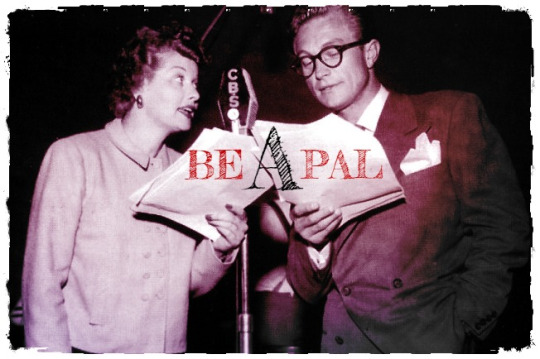
The script was also re-written as a 1950 episode of “My Favorite Husband” also titled “Be a Pal” and broadcast June 18, 1950. This was to account for the change in the characters surnames from Cugat to Cooper.
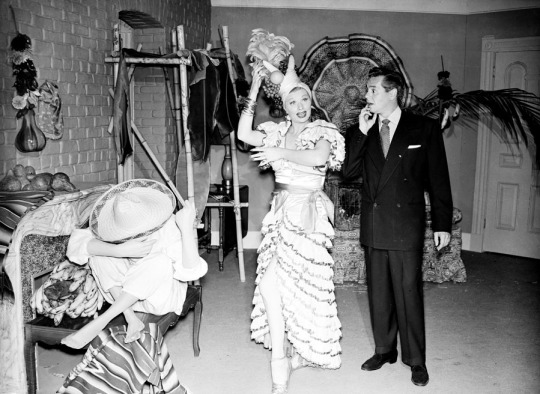
This program was also the basis for the “I Love Lucy” episode "Be a Pal" (ILL S1;E2) filmed on September 21, 1951 and first aired on October 22, 1951. The main difference is the radio versions do not include the famous Carmen Miranda lipsynch scene.

This radio version also contains story elements in its second half that were later incorporated into “The Camping Trip” (ILL S2;E29).

“My Favorite Husband” was based on the novels Mr. and Mrs. Cugat, the Record of a Happy Marriage (1940) and Outside Eden (1945) by Isabel Scott Rorick, which had previously been adapted into the film Are Husbands Necessary? (1942). “My Favorite Husband” was first broadcast as a one-time special on July 5, 1948. Lucille Ball and Lee Bowman played the characters of Liz and George Cugat, and a positive response to this broadcast convinced CBS to launch “My Favorite Husband” as a series. Bowman was not available Richard Denning was cast as George. On January 7, 1949, confusion with bandleader Xavier Cugat prompted a name change to Cooper. On this same episode Jell-O became its sponsor. A total of 124 episodes of the program aired from July 23, 1948 through March 31, 1951. After about ten episodes had been written, writers Fox and Davenport departed and three new writers took over – Bob Carroll, Jr., Madelyn Pugh, and head writer/producer Jess Oppenheimer. In March 1949 Gale Gordon took over the existing role of George’s boss, Rudolph Atterbury, and Bea Benaderet was added as his wife, Iris. CBS brought “My Favorite Husband” to television in 1953, starring Joan Caulfield and Barry Nelson as Liz and George Cooper. The television version ran two-and-a-half seasons, from September 1953 through December 1955, running concurrently with “I Love Lucy.” It was produced live at CBS Television City for most of its run, until switching to film for a truncated third season filmed (ironically) at Desilu and recasting Liz Cooper with Vanessa Brown.

MAIN CAST
Lucille Ball (Liz Cugat) was born on August 6, 1911 in Jamestown, New York. She began her screen career in 1933 and was known in Hollywood as ‘Queen of the B’s’ due to her many appearances in ‘B’ movies. “My Favorite Husband” eventually led to the creation of “I Love Lucy,” a television situation comedy in which she co-starred with her real-life husband, Latin bandleader Desi Arnaz. The program was phenomenally successful, allowing the couple to purchase what was once RKO Studios, re-naming it Desilu. When the show ended in 1960 (in an hour-long format known as “The Lucy-Desi Comedy Hour”) so did Lucy and Desi’s marriage. In 1962, hoping to keep Desilu financially solvent, Lucy returned to the sitcom format with “The Lucy Show,” which lasted six seasons. She followed that with a similar sitcom “Here’s Lucy” co-starring with her real-life children, Lucie and Desi Jr., as well as Gale Gordon, who had joined the cast of “The Lucy Show” during season two. Before her death in 1989, Lucy made one more attempt at a sitcom with “Life With Lucy,” also with Gordon.
Richard Denning (George Cugat) was born Louis Albert Heindrich Denninger Jr., in Poughkeepsie, New York. When he was 18 months old, his family moved to Los Angeles. Plans called for him to take over his father’s garment manufacturing business, but he developed an interest in acting. Denning enlisted in the US Navy during World War II. He is best known for his roles in various science fiction and horror films of the 1950s. Although he teamed with Lucille Ball on radio in “My Favorite Husband,” the two never acted together on screen. While “I Love Lucy” was on the air, he was seen on another CBS TV series, “Mr. & Mrs. North.” From 1968 to 1980 he played the Governor on “Hawaii 5-0″, his final role. He died in 1998 at age 84.
Ruth Perrott (Katie, the Maid) was also later seen on “I Love Lucy.” She first played Mrs. Pomerantz, a member of the surprise investigating committee for the Society Matrons League in “Pioneer Women” (ILL S1;E25), as one of the member of the Wednesday Afternoon Fine Arts League in “Lucy and Ethel Buy the Same Dress” (ILL S3;E3), and also played a nurse when “Lucy Goes to the Hospital” (ILL S2;E16). She died in 1996 at the age of 96.
In this episode we learn the names of all seven of Katie’s ex-husbands: Clarence, Peter, Harold, Oscar, Engelbert, and Yancy.
Bob LeMond (Announcer) also served as the announcer for the pilot episode of “I Love Lucy”. When the long-lost pilot was finally discovered in 1990, a few moments of the opening narration were damaged and lost, so LeMond – fifty years later – recreated the narration for the CBS special and subsequent DVD release.
GUEST CAST
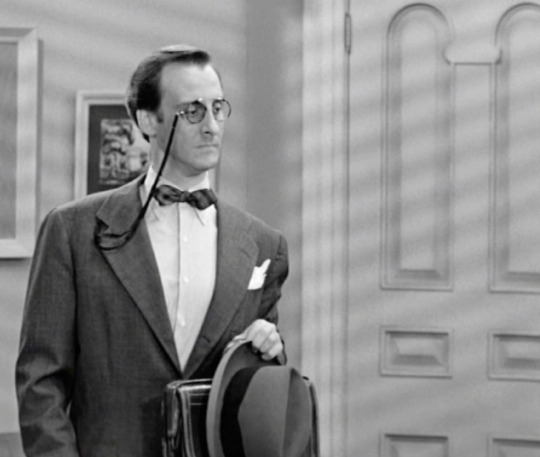
Hans Conried (Professor Philpot Millmoss) first co-starred with Lucille Ball in The Big Street (1942). He then appeared on “I Love Lucy” as used furniture man Dan Jenkins in “Redecorating” (ILL S2;E8) and later that same season as Percy Livermore in “Lucy Hires an English Tutor” (ILL S2;E13) – both in 1952. The following year he began an association with Disney by voicing Captain Hook in Peter Pan. On “The Lucy Show” he played Professor Gitterman in “Lucy’s Barbershop Quartet” (TLS S1;E19) and in “Lucy Plays Cleopatra” (TLS S2;E1). He was probably best known as Uncle Tonoose on “Make Room for Daddy” starring Danny Thomas, which was filmed on the Desilu lot. He joined Thomas on a season 6 episode of “Here’s Lucy” in 1973. He died in 1982 at age 64.
Conried will recreate this role in 1950, when the script is rewritten for the Coopers as “Be A Pal.” The only difference is that his first name is Philip, not Philpot. On television, the author remains off screen throughout.
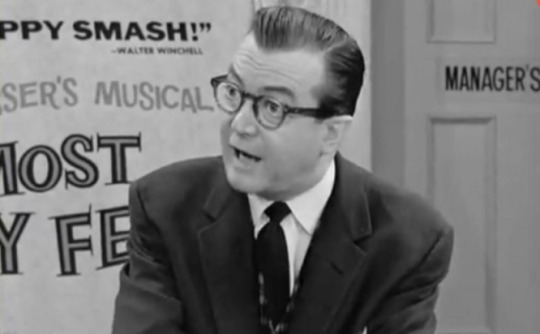
Joseph Kearns (Joe, Poker Player) appeared on “I Love Lucy” as the psychiatrist in “The Kleptomaniac” (ILL S1;E27) and later played the theatre manager in “Lucy’s Night in Town” (ILL S6;E22). His most famous role was as Mr. Wilson on TV’s “Dennis the Menace” (1959). When he passed away during the show’s final season, Lucy regular Gale Gordon took over for him, playing his brother.
In future iterations of this script, this character’s dialogue is assumed by Mr. Atterbury (Gale Gordon) and on TV by Fred Mertz (William Frawley).
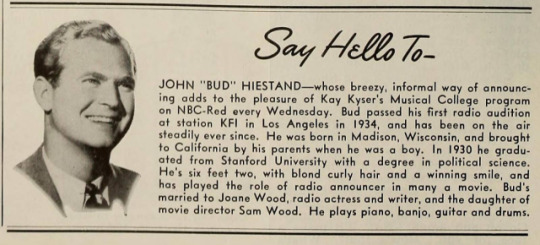
John Hiestand (Cory Cartwright) served as the announcer for the radio show “Let George Do It” from 1946 to 1950. In 1955 he did an episode of “Our Miss Brooks” opposite Gale Gordon. Cory was a regular character who was eventually written out of the series when the Atterbury’s (Gale Gordon and Bea Bendaret) were introduced.
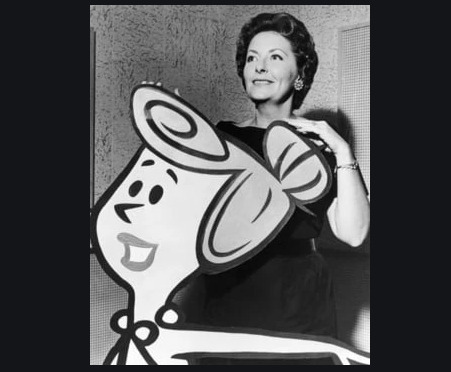
Jean Vander Pyl (Marge) is best known as the voice of Wilma Flintstone for the Hanna-Barbera cartoon “The Flintstones.” Coincidentally, Wilma’s best friend was voiced by Bea Benadaret, who will later play Iris Atterbury, Liz’s best friend on “My Favorite Husband.” On radio she was heard on such programs as “The Halls of Ivy” (1950–52) and on “Father Knows Best” before it moved to TV. She died in 1999 at age 79.
THE EPISODE
ANNOUNCER: “Let’s look in on the Cugats and see what they’re doing. Oh, but hold your hats. Liz and George are having an argument about their plans for their evening. Liz wants to go to a symphony concert and George wants to have a poker game! (As a fight announcer) And in this corner wearing a pink satin housecoat and weighing 120 pounds, ‘Battling Liz Cugat.’ And in this corner wearing a grey pinstripe suit and weighing 170 pounds is her husband ‘Gorgeous George’. Well, the first round ended in a draw and here comes the second round!”
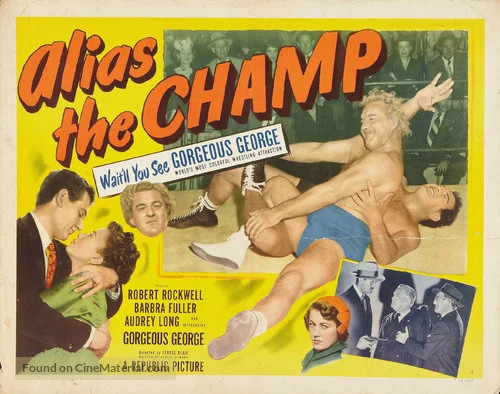
‘Gorgeous George’ was the stage name of professional wrestler George Raymond Wagner (1915–63), so named because of his long, blonde hair. He was mentioned on “I Love Lucy” in “Pioneer Women” (ILL S1;E25) and “Ricky’s Movie Offer” (ILL S4;E6).
Liz and George lament that they argue so much since getting married. George wonders why men have to wear formal clothes to a concert.
LIZ: “Because when they fall asleep the stiff shirt keeps them from falling over.”
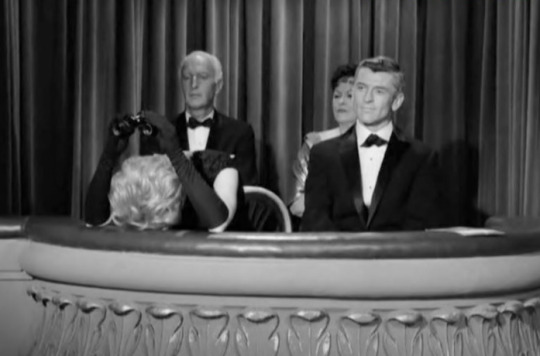
In “Lucy the Music Lover” (TLS S1;E8) it was Lucy Carmichael, not her tuxedo-clad date, that fell asleep during a classical music concert. At least she didn’t drop her opera glasses!
Liz turns on the waterworks, but George still refuses to go to the concert.
GEORGE: “And I hope Leopold falls flat on his Stokowski!”
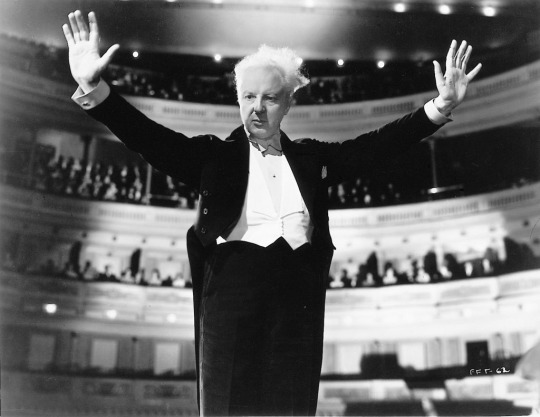
Leopold Stokowski (1882-1977) was one of the leading conductors of the early and mid-20th century, he is best known for his long association with the Philadelphia Orchestra and his appearance in Disney’s Fantasia (1940) with that orchestra.
Liz tells Katie the Maid she will be going to a woman’s club luncheon to hear a talk about marriage. Katie tells her that she has been married six times: Peter, Harold, Oscar, Engelbert, and Yancy, which she remembers because it spells out ‘P.H.O.E.Y’. She’s intentionally left off her first husband Clarence because it wouldn’t spell ‘phoey’!
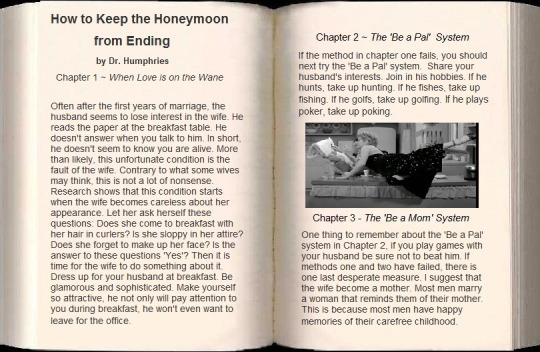
At their club luncheon, Liz and Marge (Jean Vander Pyl) listen to a guest speaker talk about “How To Be Happy, Though Married”. Professor Philpot Millmoss (Hans Conried) suggests the ladies be a pal to their husbands. Liz wonders why it has to be the woman who gives in - but Millmoss tells her to consult his new book on sale at the door for seventy nine cents.
Note: In the 1950 revision, Marge was replaced with Iris (Bea Benadaret), but the author was still played by Hans Conried. In the television version, the author remains off screen and Ethel Mertz (Vivian Vance) takes the Marge / Iris lines.
Liz resolves to employ the “Be A Pal Treatment” with George and sits beside him to read the evening newspaper. Liz pretends to be interested in the sports section.
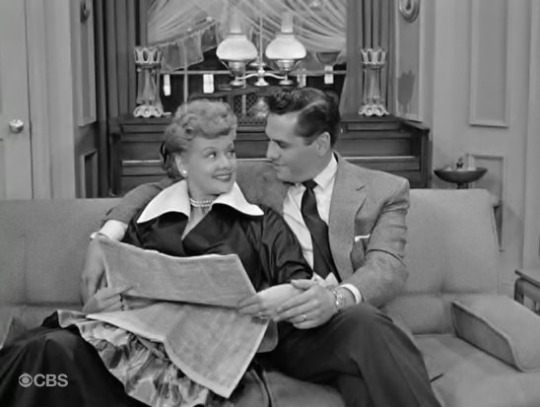
LIZ (reading): “Williams Bags Crown By TKO in eighth.″
Liz pronounces TKO phonetically as ‘Tuh-Ko” although George corrects her. The exchange was repeated verbatim between Lucy and Ricky in “The Camping Trip.”
LIZ (reading): “Midget Racing! They oughta be ashamed making those little men run around the track.”
George sarcastically calls Liz Ted Husing, and then Red Barbar.
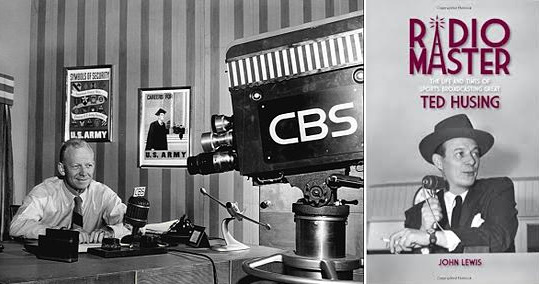
Ted Husing (1901-62) was one of CBS Radio’s most popular sportscasters. By 1950 his salary was an astronomical million dollars! Red Barber (1908-92) was a play-by-play announcer for major league baseball, then announcing for the Brooklyn Dodgers and holding down his own CBS TV sports show “Red Barber’s Club House.”
LIZ (reading): “They’re racing little girls! It says so right here,‘Yesterday at Tanforan a race was won by a three year-old maiden!’ She certainly was carrying a lot of money for a little girl. She had $2,000 in her purse.”
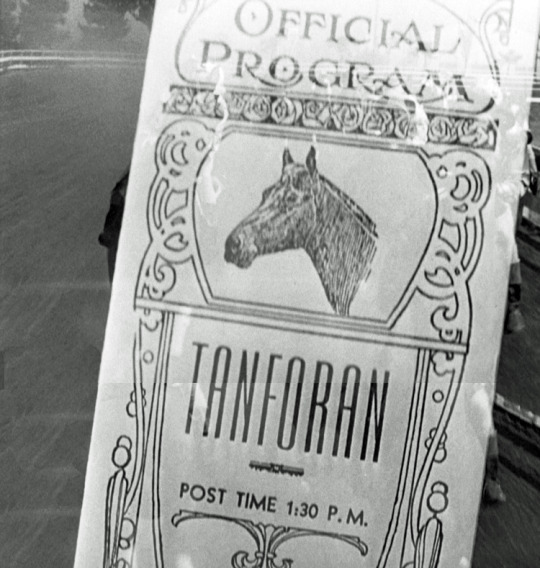
The line is virtually identical on television, except that Tanforan (a horse racetrack outside San Francisco) was changed to the more familiar Churchill Downs.
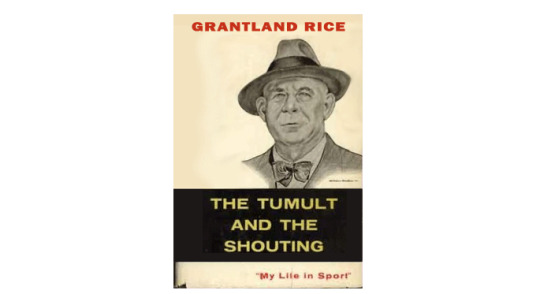
George / Ricky then refers to Liz / Lucy as Grantland Rice (1880–1954), a sportswriter known for his elegant prose, although the reference was removed for TV syndication when Rice died in 1954. It was restored for the DVD release. Clueless Liz / Lucy think he is a food!
Liz is determined to join in the poker game that evening, despite not knowing anything about the card game. Lucy also tried this tactic in the television version of “Be A Pal”. The other poker players are Joe (Joseph Kearns) and Cory Cartwright (John Hiestand), George’s bachelor friend.
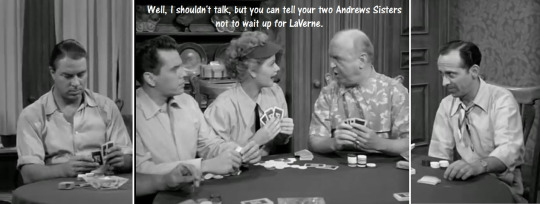
In the 1950 radio re-write, Joe was voiced by Hans Conried (doubling with Millmoss) and Gale Gordon as Mr. Atterbury, a role previously played in earlier episodes by Hans Conried. On television, the poker players were Fred Mertz (William Frawley), Hank (Richard Reeves, left) and Charlie (Tony Michaels, right).
LIZ CUGAT / LIZ COOPER / LUCY RICARDO (looking over her cards): “There’s her sister! What do you have?”
JOE / MR. ATTERBURY / FRED: “I shouldn’t talk, but tell your two Andrews Sisters not to wait up for LaVerne!”
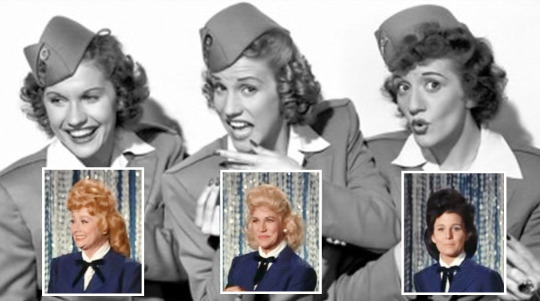
The Andrews Sisters were a close-harmony singing group most popular during World War II. In 1969 Lucy played LaVerne Andrews on an episode of “Here’s Lucy” that guest-starred Patty Andrews as herself. Lucie Arnaz took the role of the third Andrews sister, Maxene.
A few days later, George confides in Cory that Liz has been driving him crazy by sticking to his side like glue, trying to be interested in everything that he is. George decides to go away on a camping trip to get away from her for a while. Cory suggests that George take Liz with him and make the trip so rigorous that she will regret trying to ‘be a pal’.
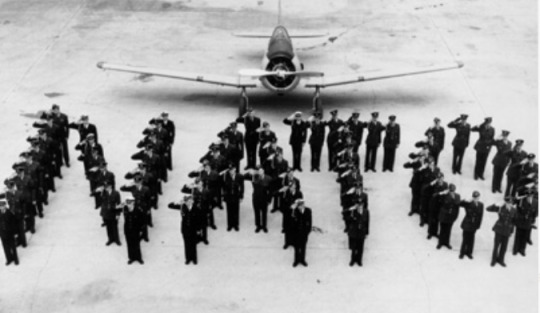
At the end of Act One, there is a public service announcement about NATO - the newly-formed North Atlantic Treaty Organization.
Katie warns Liz about her husband’s plan, having overheard George and Cory talking. Liz spills the beans to Cory and blackmails him to turn the tables on George at the campsite.
Liz and George engage in a fishing contest, just like Lucy and Ricky in “The Camping Trip”. When Liz pretends to know all about fishing, George calls her sarcastically dubs her Izaak Walton.
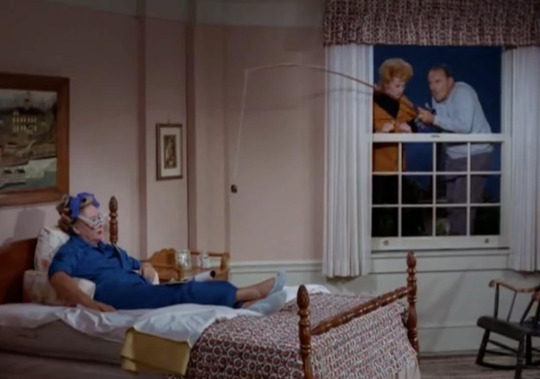
Izaak Walton (1594-1683) was an English writer known for The Compleat Angler (1653), a famous prose and poetry celebration of fishing. His name was mentioned by Mr. Mooney before ‘fishing’ for Viv’s glasses in “The Loophole in the Lease” (TLS S2;E12) in 1963.
Once George is out of sight, Cory arrives with some store-bought fish to fool George.
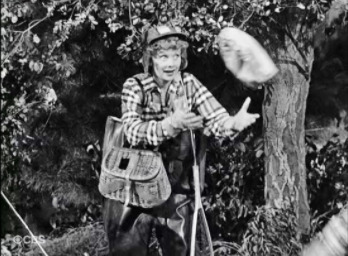
LIZ: “Throw them to me, Cory. That way I can tell George I caught 'em.”
George and Liz decide to bet on who can hike back to the campsite fastest. Luckily, Liz has Cory waiting in a car to assure that she wins!
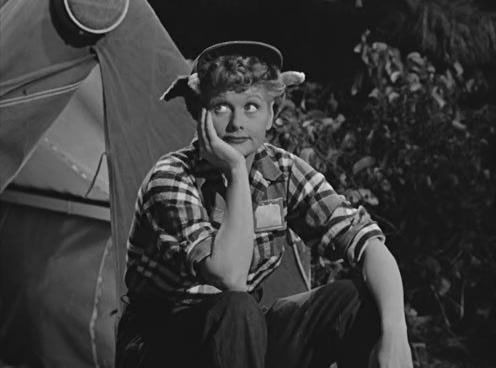
Back at camp, Liz is patiently waiting for George, who trudges in weary and parched. Liz confesses that she got back so early she had time to wash her hair so there is no water.
Next morning Liz and Cory conspire to make George think she’s an expert duck hunter and sharp-shooter! Liz takes aim at the tree, and on cue Cory tosses a duck at her feet.
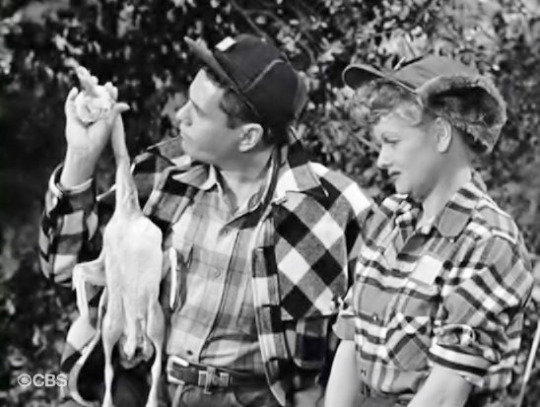
GEORGE: “I don’t get it. Liz. First you catch a Lake Trout in a stream, now you shoot a duck marked Birds Eye Frozen Foods!”
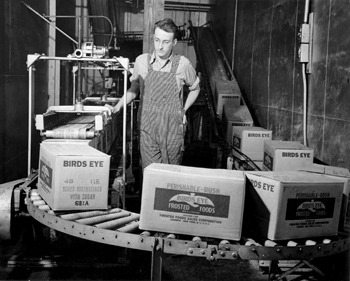
In the early 1900s, Clarence Frank Birdseye II of Montclair, New Jersey, received patents for the development of improved methods to freeze fish for commercial production. In 1922, he formed a company, Birdseye Seafood, Inc., Birdseye created a new company, General Seafood Corporation, to promote this method. In 1929, Birdseye sold his company and patents for $22 million to General Foods Corporation which founded the Birds Eye Frozen Food Company. Although primarily marketing frozen vegetables, they have occasionally sold other foods as well.
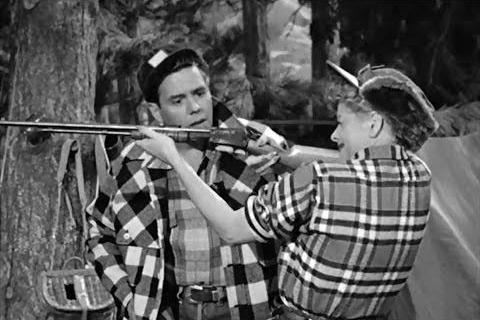
A target practice ensues where a discretely hidden away Cory clangs an anvil every time Liz shoots at a distant horseshoe. A suspicious George gets wise to Cory and Liz’s scheme and trains his rifle on on the tree. A frightened Cory comes down but all ends happily.
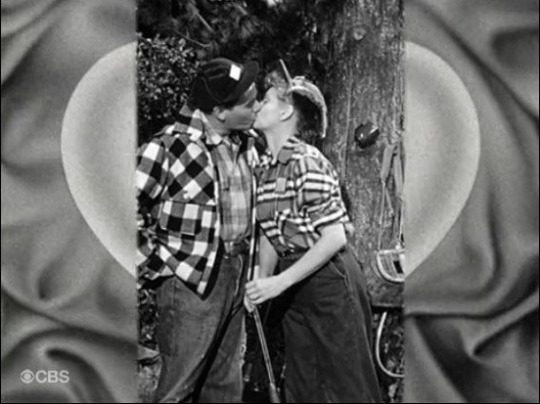
LIZ (to George): “Let’s not be pals or companions. Let’s not be even be friends anymore. Let’s just go back to being man and wife.”
In the bedtime tag, Liz tries to wake a sleeping George. She sees a note pinned to his chest that says:
DEAR PAL. YES, I AM ASLEEP. I TOOK A SLEEPING PILL TO MAKE SURE OF IT. GOOD NIGHT.
LIZ: “Aww...isn’t he cute? Goodnight, George.”
#My Favorite Husband#Be A Pal#The Camping Trip#I Love Lucy#Richard Denning#Lucille Ball#Hans Conried#Jean Vander Pyl#Birdseye#Duck Hunting#Izaak Walton#NATO#Clarence Birdseye#Birds Eye Frozen Foods#Grantland Rice#The Andrews Sisters#Red Barber#Ted Husing#Tanforan#Leopold Stokowski#Radio#1948#John Hiestand#Gorgeous George#Ruth Perrott#Bob LeMond#CBS Radio#Desi Arnaz#Joseph Kearns#Richard Reeves
0 notes
Text
Daily Portions

by Joseph Philpot
Devotional for January 25th
"For those who are after the flesh mind the things of the flesh; but those who are after the Spirit the things of the Spirit." - Romans 8:5
None but those who are partakers of a heavenly birth feel heavenly realities to be their choice element, holy things their sweetest meditation, and the solemn worship of God their supreme delight. Look at this mark as a touchstone of divine life; for to be spiritually-minded a man must be spiritual, and to be spiritual he must have received the Spirit and been made a partaker of that"kingdom of God which is righteousness, and peace, and joy in the Holy Spirit" (Romans 14:17). Have you never found in reading the Scriptures a sweet peace distill over your soul, as the glorious promises came forth one after another as the stars in the evening sky, each one brighter and clearer, and you felt a blessed persuasion of your interest in them? When at the throne of grace, favored with liberty of spirit and access to your heavenly Friend, have you never felt the peace of God to drop into your heart, and like oil upon the waves, to allay every rising of rebellion within? Have you never found, in conversing with the saints of God, a sweet flowing of heart to heart and soul to soul, and felt that such conversation left behind a blessed fragrance upon your spirit? Have you never in the house of prayer had your heart and affections drawn up to the things of God; and as you sat and heard Christ, his Person and work, his grace and glory set forth, faith was drawn out to believe, hope to cast forth its anchor, and love and affection to flow, so that you experienced a spirituality of mind, a heavenly calm, and a holy peace that touched every spring of your soul, and watered it as the river that went out of Eden to water the garden?
15 notes
·
View notes
Text

"Four Men Committed," Windsor Star. July 14, 1943. Page 14. --- Charged With Looting From Summer Homes on Lake Erie ---- Four Windsor men charged with breaking into five summer cottages of Lake Erie beach resorts and plundering them of large quantities of possessions of the owners, were committed for trial by jury, by Magistrate J. A. Hanrahan, following a preliminary hearing Tuesday afternoon in the county police court.
ADDITIONAL CHARGE An additional charge against the four, of breaking into the P. Philpot bake shop in Essex, and stealing $500 in currency and war savings stamps, will have a preliminary hearing in the county police court on Saturday.
The four accused are Louis Balog. Joseph Peltier, Donald George and Alex Fazekas. Balog and Peltier had Bernard Cohn as defence counsel. George was represented by Captain S. A. Wallace, and Fazekas by Ross Riddell, K.C.
A great quantity of possessions, including clothing and silverware, were heaped up in the courtroom as evidence in the case, and some of it was identified by Mrs. Charels Saunders, whose Cedar Beach cottage in Gosfield South Township was entered.
Two separate charges were made against Joseph Peltier of breaking into the cottages of H. A. Holderman and C. A. Davies at Cloverdale Beach.
In addition to the Saunders cottage. the four men also were charged with breaking into and stealing from the Oxley Beach cottages in Colchester South Township, of Charles Hess. Mrs. W. H. Stranger, Louis Delman and Dr. Carl McClelland.
ALLEGED JAIL-BREAKER Fazekas on Saturday also will face a charge of breaking out of Riverside jail on June 17.
Investigation of the breaking and entry charges was made by Constables F. C. Thurston and J. S. Bennett of the Ontario Provincial Police, who were the chief witnesses in the preliminary hearing.
Of the four accused, only Fazekas elected for trial by jury. At the conclusion of the case for the Crown, the magistrate having concluded that a prima facae case had been established against all four defendants, exercised his right to commit the four men for trial by jury.
ONLY EVIDENCE HEARD Only testimony concerning the breaking into and entering of the Saunders case was heard, following which, counsel for the defence, with the consent of their clients, waived preliminary hearings on the charges relating to thefts from the other cottages.
#windsor#county police court#essex county#breaking and entering#break and enter#crime wave#looting cottages#summer cottages#cottage country#criminal gang#ex-convict#canada during world war 2#crime and punishment in canada#history of crime and punishment in canada
0 notes
Text
Is your conscience made honest? Does that monitor in your bosom speak the truth? Tell me what it says. Does it not say, “Few trials, few consolations; few sorrows, few joys; few difficulties, few testimonies from God; few sufferings, few discoveries of love and blood?” Does not the Apostle say, “As the sufferings of Christ abound in us, so our consolation also abounds by Christ?” (2 Cor. 1:5.) And does he not say, “Our hope of you is steadfast, knowing, that as you are partakers of the sufferings, so shall you be also of the consolation?”And does he not tell us to be mindful not to forget what the Lord says when he speaks to his people, that the lot of a child is to endure chastisement? He says, “My son, despise not the chastening of the Lord, nor faint when you are rebuked of Him; for whom the Lord loves He chastens, and scourges every son whom He receives. If you endure chastening, God deals with you as with sons; for what son is he whom the father chastens not? But if you be without chastisement,” (O solemn word! O how applicable to thousands!) “whereof all are partakers, then are you bastards, and not sons.”
Joseph Charles Philpot
#Joseph Charles Philpot#2 Corinthians 1:5#sharing in the sufferings of christ#i can attest to this#a vital reminder#remember this#this is why i love being catholic#hebrews 12:6#gold in the fire#chastisement#trials#suffering#a vital warning#we are the children of God#conscience
5 notes
·
View notes
Text
Rest Upon The Everlasting Arms
"Underneath are the everlasting arms."
How Moses brought before the people the eternity of God! He will have nothing to do with time. What is time? A fragment, merely like the foam of the sea compared with the mighty ocean. The ocean is eternity; time is merely the foam upon the wave. "Underneath are the everlasting arms" Deut 33:27. And depend upon it, if the everlasting arms are underneath the saints of God, for it is of and to those who the words are spoken, they are there for some purpose.
God puts affliction upon affliction to bring the soul down, that it may fall into and upon the everlasting arms, and find how firm and strong they are. And have you not often found it so? Do not lie against your right. How many trials in providence you have been brought through. How conspicuously the Lord has appeared in this and that instance, so that your unbelief and infidelity were, for the time at least, thoroughly silenced, and faith saw the hand of God so clearly that you felt as if you could never doubt again.
Have you not had many sweet supports on your bed of languishing, many precious seasons when you could bless God for laying upon you his afflicting hand? And have you not found that strength was always given to you according to your day, that with every trial power was given you to bear it, and that out of your deepest afflictions came your greatest blessings?
Why are you not in hell? Do you not deserve to be there? Why still upon praying ground, with a good hope through grace, and your soul waiting for the Lord to appear, more than those that watch for the morning? If these arms have once supported you, will they not support you again?
Would they be everlasting if they could part asunder and let you fall through? Rest upon them and you will find how strong they are.
Joseph Philpot
0 notes
Text
[Eugene Volokh] Evidence from Around the Framing: English Non-Newspaper Freedom-of-the-Press Cases
In this post, I'm continuing my series on "Freedom for the Press as an Industry, or for the Press as a Technology? From the Framing to Today," based on my Penn Law Review article. Here, I'll start going through the 15 early cases that show that courts and lawyers during the early years of the Republic understood the freedom of the press as extending to authors regardless of whether they were members of the press-as-industry. (For length reasons, this post will deal just with three English cases that were well-known in America; posts over the next couple of days will deal with the early American cases.) Though the American cases follow the drafting of the First Amendment by one to five decades, they are entirely consistent with the 1700s evidence discussed above. I have seen no reason to think there was some change from a press-as-industry understanding in the 1700s to a press-as-technology understanding as shown in those cases.
If anything, the common definition of "press" was more clearly focused on the press-as-technology in the late 1700s than it was in the 1820s and 1830s. The only possibly relevant definition of "press" in Samuel Johnson's 1755-1756 dictionary referred just to the printing press; the same was true of the 1790 edition and of Noah Webster's 1806 A Compendious Dictionary of the English Language, published in America. Noah Webster's 1828 dictionary, on the other hand, included both the technology and the industry as possible meanings of "press" (though the dictionary specifically defined the "liberty of the press" as a right of "every citizen" and as including the right to publish "books" and "pamphlets"). Likewise, the Oxford English Dictionary reports that the press-as-industry definition was just developing in the late 1700s and early 1800s, giving this as definition 3(d) of "press":
Newspapers, journals, and periodical literature collectively.... This use of the word appears to have originated in phrases such as the liberty of the press, to write for the press, to silence the press, etc., in which 'press' originally had sense 3c [The printing-press in operation, the work or function of the press; the art or practice of printing], but was gradually taken to mean the products of the printing press. Quotations before 1820 reflect the transition between these senses.
Yet despite that development, the 1820s and 1830s cases continued to treat the "freedom of the press" as being everyone's freedom to use the technology. If judges used such a meaning in the 1820s and 1830s, it would have been even more certainly used in 1791, when the alternative meaning of "press" to refer to the industry was just beginning to emerge.
[A.] Discussions of the Freedom of the Press as Protecting Non-Press-as-Industry Writers (England)
Twelve of the fifteen cases I discuss involve "freedom of the press" or "liberty of the press" being expressly discussed with regard to the rights of people who were not members of the press-as-industry. These were not printers, newspaper publishers, or editors, but rather people who wrote books, pamphlets, newspaper ads, or letters and other submissions to the editor.
Sometimes the authors won and sometimes they lost: the freedom of the press, even when it was implicated, was often not seen as providing particularly broad protection. But in all these cases, the lawyers and the judges were willing to discuss the non-press-as-industry defendants' rights under the freedom of the press. And there is no record of anyone arguing that the defendants lacked such rights because they were not members of the press-as-industry.
Of these twelve cases, three are English, but I include them because American judges and lawyers understood them as being relevant to American constitutional law—both as evidence of the English "liberty of the press" as inherited by Americans at the Framing, and as influences on post-Framing American legal developments. Justice Story's Commentaries on the Constitution of the United States, to give just one example, refers to only five cases in the "liberty of the press" section, and two of them are English (the Dean of St. Asaph's Case and Burdett, both discussed below).
The American freedom of the press was often seen as broader than the English common law definition, but I haven't seen sources suggesting that it was seen as narrower. And, as the discussion below shows, the English cases are entirely consistent with the American cases on the question that we are discussing.
[1.] Rex v. Shipley (Dean of St. Asaph's Case) (1784)
William Shipley, a minister who held the position of Dean of St. Asaph Cathedral, was prosecuted in 1784 for seditious libel for reprinting a pamphlet. (The pamphlet itself was also written by someone who was not a journalist or printer, William Jones, a lawyer and judge.) Thomas Erskine defended Shipley, arguing that the liberty of the press meant the jury had to determine whether the pamphlet was indeed libelous — an argument that assumed the liberty covered Shipley, who was not a member of the press-as-industry.
Lord Mansfield's opinion in Shipley rejected Erskine's argument, and followed the then-orthodox English rule that the judge would decide whether the publication was libelous. But Mansfield did not suggest that the liberty of the press was limited to members of the press-as-industry, which would have categorically excluded Shipley. Rather, Mansfield wrote (echoing Blackstone) that "[t]he liberty of the press consists in printing without any previous licence, subject to the consequences of law." Under this view, all publications—including those by non-press-as-industry authors such as Shipley—were protected only from prior restraints, and all could be punished by the law of seditious libel.
And Erskine's defense was known and approved of in America. Both the case and Erskine's arguments were cited extensively in People v. Croswell, the leading 1804 New York case that dealt with whether truth was a defense in libel cases. Erskine's position was quoted by the defense in the 1806 case United States v. Smith; though the reference was to the role of the jury generally, and not to free speech in particular, the detailed quotation of Erskine's speech to the jury suggests that the speech was known and respected in early America. Later, Justice Story mentioned the "celebrated defense of Mr. Erskine, on the trial of the Dean of St. Asaph" in the freedom of the press section of his 1833 Commentaries on the Constitution.
The quotations gave no hint that Erskine's use of the liberty of the press to defend a churchman rather than a newspaperman was at all questionable. Rather, they seem consistent with the American understanding of the right's being a right of "every citizen."
[2.] Rex v. Rowan (1794)
Archibald Hamilton Rowan was an Irish radical politician and one of the leaders of the Society of United Irishmen. The Society published a 1500-word broadside, titled "An Address to the Volunteers of Ireland"; Rowan distributed it, which led to his being prosecuted for seditious libel.
Rowan was a politician, not an editor or a printer. Nonetheless, both the prosecutors and the defense counsel, John Philpot Curran, told the jury that the case touched on the "freedom of the press" or the "liberty of the press"; their disagreement was about whether Rowan's actions were an abuse of the freedom, and thus punishable. As in Shipley, the liberty of the press was apparently seen as applying to all, not just to members of the press-as-industry.
Rowan's case was well publicized in America. A full-length report of the trial was reprinted in New York, and advertised both there and in Baltimore. The trial was discussed in newspapers, as was Rowan's imprisonment and escape. Shortly after his escape, Rowan fled to America, where he received some attention from fellow democrats and became an acquaintance of Thomas Jefferson. The case was remembered in later years as well: Curran's speech in Rowan's defense, which included discussion of the liberty of the press, was reprinted in America in separate collections, in 1805, 1807, and 1811, and the Rowan trial was mentioned by prosecutor William Wirt in Aaron Burr's 1808 trial for treason.
[3.] Rex v. Burdett (1820)
Rex v. Burdett stemmed from a letter to the editor written by Sir Francis Burdett, a nobleman and reformist politician rather than a printer or journalist. Though Burdett was not a member of the press-as-industry, the presiding judge referred to the "liberty of the press" four times in his opinion, and twice in his instructions to the jury. The judge's opinion also stressed that "the liberty of the press" means that "every man ought to be permitted to instruct his fellow subjects." The prosecutor mentioned the "liberty of the press" as well.
Burdett was well-known in America. It was cited as to "liberty of the press" in Chancellor Kent's 1827 Commentaries on American Law and in Joseph Story's 1833 Commentaries on the Constitution, as to venue in libel cases in Commonwealth v. Blanding (1825), and in a general note on libel law following People v. Simons (1823) [which I will discuss in a later post].
0 notes
Video
youtube
Idling life away like an idiot or a madman (Joseph Philpot, "The Soul's Growth in Grace" 1837) When one is spiritually reborn, he sees at one and the same moment . . . God and self, justice and guilt, power and helplessness, a holy law and a broken commandment, eternity and time, the purity of the Creator, and the filthiness of the creature. And these things he sees, not merely as declared in the Bible, but as revealed in himself as personal realities, involving all his happiness or all his misery in time and in eternity. Thus it is with him as though a new existence had been communicated, and as if for the first time he had found there was a God! It is as though all his days he had been asleep, and were now awakened; asleep upon the top of a mast, with the raging waves beneath; as if all his past life were a dream, and the dream were now at an end. He has been . . . hunting butterflies, blowing soap bubbles, angling for minnows, picking daisies, building houses of cards, and idling life away like an idiot or a madman. He had been perhaps wrapped up in a religious profession, advanced even to the office of a deacon, or mounted in a pulpit. He had learned to talk about Christ, and election, and grace, and fill his mouth with the language of Zion. But what did he experimentally know of these things? Nothing, absolutely nothing! Ignorant of his own ignorance (of all kinds of ignorance the worst), he thought himself rich, and increased with goods, and to have need of nothing; and knew not that he was wretched, and miserable, and poor, and blind, and naked.
#www.gracegems.org#Grace Gems#Apologetics#Christianity#Joseph Philpot#The Soul's Growth in Grace#Idling life away like an idiot or a madman
2 notes
·
View notes
Text
Daily Portions

by Joseph Philpot
Devotional for January 13th
"To be carnally-minded is death; but to be spiritually-minded is life and peace." - Romans 8:6
Just in proportion as our heart and affections are engaged on heavenly objects, shall we feel a sweet savor of heaven resting upon our spirit; and as we can only give back what we receive, every going forth of divine life from the soul below is but the fruit and effect of the incoming of that life from above. Christ is our life above (Colossians 3:4); and as he by his Spirit and grace maintains the life of faith in the soul, it manifests itself in gracious actings upon himself. Without this spirituality of mind, religion is but a mere name, an empty mask, a delusion, and a snare. God does not take into heaven, into the fullness of his own eternal bliss, those whom he does not love, and who do not love him. It is a prepared people for prepared mansions. And this preparedness for heaven, as an inward grace, much consists in that sweet spirituality of mind whereby heavenly things become our only happiness, and an inward delight is felt in them, that enlarges the heart, ennobles the mind, softens the spirit, and lifts the whole soul, as it were, up into a holy atmosphere in which it bathes as its choice element. This is"life,"not the cold, dead profession of those poor carnal creatures who have only a ’natural faith’ in the Lord Jesus Christ and the truths of his gospel; but that blessed life which shall never die, but live in the eternal presence of God when earth and all it holds shall be wrapped in the devouring flames. And it is"peace"-- the Redeemer’s dying legacy -- whereby, as he himself fulfils it, he calms the troubled waves of the soul, stills every rebellious movement, and enthrones himself in the heart as the Prince of peace.
8 notes
·
View notes